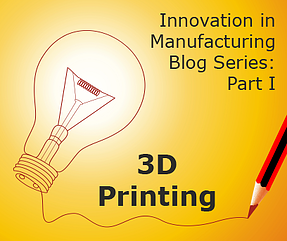 If lean was the machine that changed the world, additive manufacturing, otherwise known as 3D printing, just may be the machine that will change it again. When 3D printers are sold at Staples for consumer use, you know they’ve come a long way. At current prices they're still too expensive to be common holiday gifts for small children, but at this point, can the “Easy Bake Oven” equivalent be far behind? If 3D printing is reaching the point where it may soon be a common household item, manufacturers need to consider how this technology will affect them and realign their strategy to take advantage of the all the advances it can offer.
If lean was the machine that changed the world, additive manufacturing, otherwise known as 3D printing, just may be the machine that will change it again. When 3D printers are sold at Staples for consumer use, you know they’ve come a long way. At current prices they're still too expensive to be common holiday gifts for small children, but at this point, can the “Easy Bake Oven” equivalent be far behind? If 3D printing is reaching the point where it may soon be a common household item, manufacturers need to consider how this technology will affect them and realign their strategy to take advantage of the all the advances it can offer.
Rapid Prototypes
When people talk about 3D printing, they always mention rapid prototyping. Prototypes are often either hand crafted works of art or funky looking and utilitarian. In both cases, creating prototypes can be expensive and time consuming. Additive manufacturing can simplify prototyping and creating multiple generations of prototypes may be as simple as updating the software. But 3D printing will change a lot more than the prototyping process.
Changing Skill Sets
For the near term, we’ll still need people who know how to create tools and run machines, but more and more we’ll be needing people with the ability to think and design in 3D. Converting product ideas into code will be critical. Design and engineering jobs — perhaps even the actual manufacturing — will move out of centralized factories and relocate to wherever the best skills exist.
Many people believe that 3D printing will bring jobs back to the U.S., but the good jobs will still require superior education in math, technology and science. Software creation can be done anywhere, so it’s critical that we don’t allow our educational system to lag behind other regions or good jobs may continue to erode.
The very principles of engineering and design may change. Since we no longer have to plan for machining slots or holes, we may be able to choose different tolerances, different edges or different ways that parts need to be assembled. All of those would simply be programmed into the product code and the printer would create exactly what we’ve designed.
Beyond Mass Customization
Since changing the product is as simple as changing the software, additive manufacturing is the perfect equipment for mass customization. Customers can easily have the product exactly the way they want it — unique colors, materials, labels and dimensions are all easy to accomplish just by downloading new code.
As we are able to move beyond the plastics and resins we use today into more advanced materials, additive manufacturing will move away from industrial equipment and novelties into consumer goods and medical products.
We have already seen 3D printing create artificial skin that will ultimately be good enough to use in grafts, and one can easily envision the day when waste materials go in one side of the factory and new 3D printed goods come out the other, for the ultimate in recycling and waste management.
Soon we may start making every product bespoke. Imagine entering your room dimensions and having custom built furniture delivered, or keying in your measurements for custom jeans.
Supply Chain
The ramifications for supply chain management are enormous. Goods may not be physically shipped from supplier to manufacturer to customer. They may be printed in the home or at the point of sale, assembly or use. Suppliers won’t be selected for their advanced CNC equipment, high quality and superior machining skills. The real prize will be a supplier’s ability to think and design in 3D and to create error free code for instantaneous download.
When we buy a car, will we still go to a local dealer showroom and select something that was made and shipped from somewhere else, or will we go to a regional or local facility where they print our perfect car while we wait?
Additive manufacturing clearly holds the promise of completely changing manufacturing as we know it. All manufacturers should be investigating and testing to understand how it will affect their market and their competitive position.





